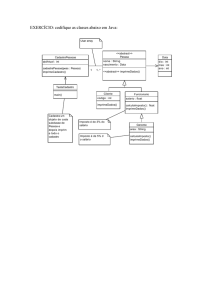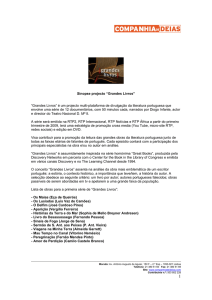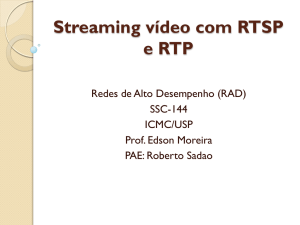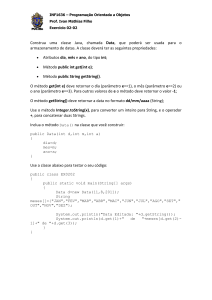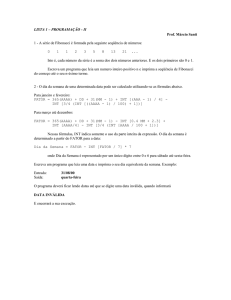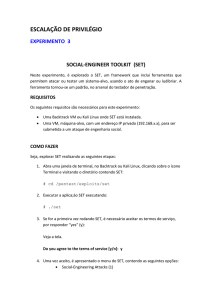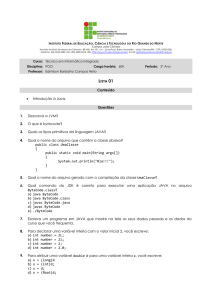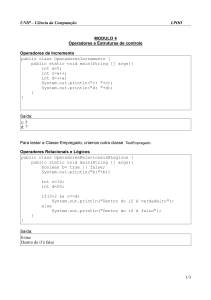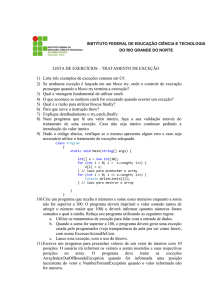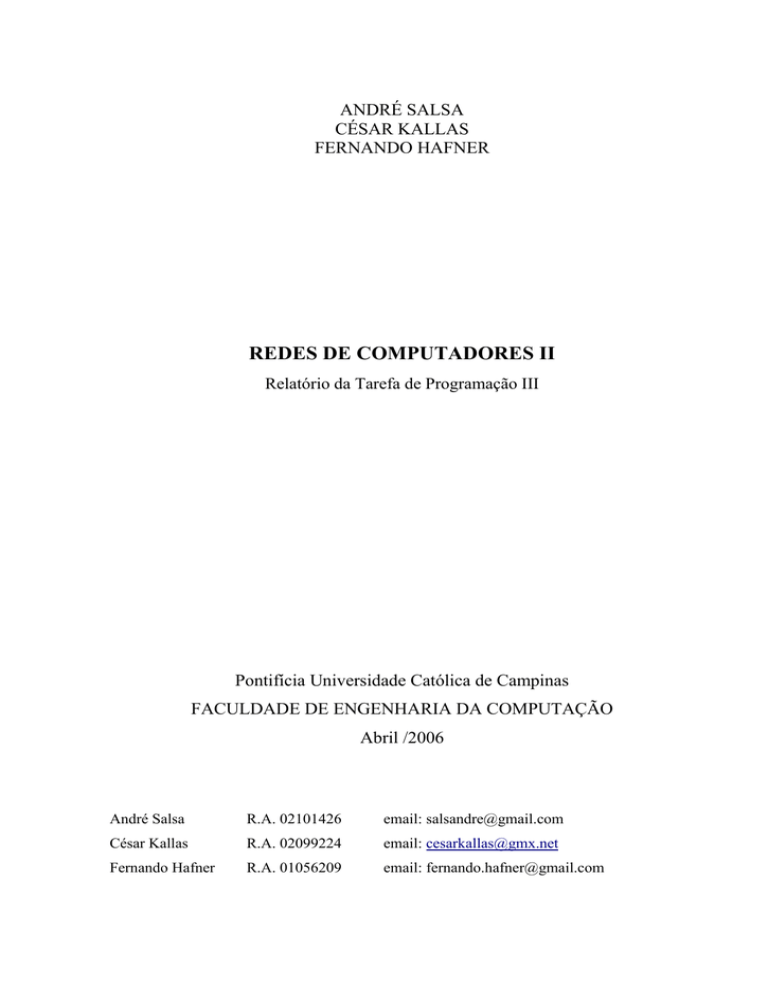
ANDRÉ SALSA
CÉSAR KALLAS
FERNANDO HAFNER
REDES DE COMPUTADORES II
Relatório da Tarefa de Programação III
Pontifícia Universidade Católica de Campinas
FACULDADE DE ENGENHARIA DA COMPUTAÇÃO
Abril /2006
André Salsa
R.A. 02101426
email: [email protected]
César Kallas
R.A. 02099224
email: [email protected]
Fernando Hafner
R.A. 01056209
email: [email protected]
Divisão das Notas:
André Salsa
César Kallas
Fernando Hafner -
33%
33%
33%
TRANSFERÊNCIA E REPRODUÇÃO DE VÍDEO EM FLUXO
CONTÍNUO COM RTSP E RTP
Trabalho requisitado pelo professor de
Redes de Computadores II, ministrada
pelo
professor
Juan,
da
Pontifícia
Universidade Católica, com o intuito de
avaliação acadêmica dos alunos, para
efeito de cálculo da média final.
Pontifícia Universidade Católica de Campinas
FACULDADE DE ENGENHARIA DA COMPUTAÇÃO
Abril /2006
1 ) Nível de Atendimento aos Requisitos da Atividade
Nesse laboratório foi dado um servidor e um cliente de reprodução de vídeo, que envia
comandos de controle utilizando RTSP (Real Time Streaming Protocol) e envia dados (o
vídeo, propriamente dito) utilizando RTP (Real Time Protocol).
Tanto o aplicativo servidor como o cliente, estavam parcialmente implementados. Para essa
atividade de programação, foi pedido aos alunos que completassem as rotinas faltantes nos
aplicativos. Todas as rotinas faltantes foram implementadas.
2 ) Descrição das Rotinas modificadas
Segue abaixo a descrição do que foi implementado/modificado em cada uma das
rotinas :
Client.java
Classe que implementa o cliente e a interface com o usuário que envia os comandos RTSP
para tocar o vídeo.
Foram modificadas as rotinas tratadoras da ação de pressionar os botões: Setup, Play, Pause,
Teardown.
class setupButtonListener implements ActionListener{
public void actionPerformed(ActionEvent e){
Estados:
a) Init (botão Setup):
Inicializa contato com o servidor, e muda de estado para pronto (1),
pronto para tocar o vídeo.
RTPsocket = new DatagramSocket(RTP_RCV_PORT,rcvdp.getAddress());
RTPsocket.setSoTimeout(5);
state = 1;
b) Ready (botão Play)
Começa a tocar o vídeo, atualiza o número de seqüência do RTSP e muda
o estado para tocando (2).
RTSPSeqNb++;
state = 2;
c) Playing (botão Pause)
Pausa o vídeo que está tocando no momento, mudando o status para
parado.
RTSPSeqNb++;
state = 1;
d) Stop (botão teardown)
Pára de tocar o vídeo e volta para estado de parado (não tocando).
state = 0;
RTPpacket.java
A classe RTPpacket é responsável pelo empacotamento do vídeo no protocolo RTP.
Nessa classe foram dados diversos campos que compõem o cabeçalho de um pacote RTP (
declarados como inteiros ). A tarefa principal para essa classe foi inserir esses valores, bit a
bit, em um vetor que armazena os campos do cabeçalho do pacote RTP.
public RTPpacket() – Construtor da classe RTPpacket, que cria os campos de cabeçalho e
payload.
3 ) Instruções para Geração e Execução do Programa
Para geração do programa utilizando o ambiente Linux e o compilador java 1.4 ou
superior, basta compilar o arquivo fonte utilizando o comando abaixo:
Exemplo:
[chk@cesarkallas Ap3]$ javac -d . *.java
[chk@cesarkallas Ap3]$
Para executar:
Servidor:
java Server [porta]
[chk@cesarkallas Ap3]$ java Server 1200
Cliente:
java Client [servidor] [porta servidor] [video]
[chk@cesarkallas Ap3]$ java Client localhost 1200
4.1 ) Tempo Gasto
O tempo total gasto para o desenvolvimento da atividade ( leitura/estudo da
documentação e implementação) foi de 4 dias; dedicando aproximadamente 1 horas por dia.
4.2 ) Considerações Positivas
O programa que nos foi apresentado como base nos permitiu observar como funciona
a transferência de vídeo por streaming na prática. A flexibilidade do programa base, ajudou
consideravelmente na execução de testes, podendo demonstrar como um vídeo pode ir de um
ponto à outro em pequenas partes.
4.3 ) Considerações Negativas
Dada a complexidade do programa, e a quantidade de código já desenvolvido, houve
muito pouco trabalho por parte dos alunos para completar essa atividade.
Anexo 1 – Fonte dos programas
RTPpacket.java
//class RTPpacket
public class RTPpacket{
//size of the RTP header:
static int HEADER_SIZE = 12;
//Fields that compose the RTP header
public int Version;
public int Padding;
public int Extension;
public int CC;
public int Marker;
public int PayloadType;
public int SequenceNumber;
public int TimeStamp;
public int Ssrc;
//Bitstream of the RTP header
public byte[] header;
//size of the RTP payload
public int payload_size;
//Bitstream of the RTP payload
public byte[] payload;
//-------------------------//Constructor
of
an
RTPpacket
object
from
header
fields
and
payload
bitstream
//-------------------------public
RTPpacket(int
PType,
int
data_length){
//fill by default header fields:
Version = 2;
Framenb,
int
Time,
byte[]
data,
int
Padding = 0;
Extension = 0;
CC = 0;
Marker = 0;
Ssrc = 0;
//fill changing header fields:
SequenceNumber = Framenb;
TimeStamp = Time;
PayloadType = PType;
//build the header bistream:
//-------------------------header = new byte[HEADER_SIZE];
header[0] = (byte) (Version << 6 | Padding << 5 | Extension << 4 |
CC);
header[1] = (byte) (Marker << 7 | PayloadType);
header[2] = (byte) (SequenceNumber >> 8);
header[3] = (byte) (SequenceNumber & 0xFF);
header[4] = (byte) (TimeStamp >> 24);
header[5] = (byte) ((TimeStamp >> 16) & 0xFF);
header[6] = (byte) ((TimeStamp >> 8) & 0xFF);
header[7] = (byte) (TimeStamp & 0xFF);
header[8]
= (byte) (Ssrc >> 24);
header[9]
= (byte) ((Ssrc >> 16) & 0xFF);
header[10] = (byte) ((Ssrc >> 8) & 0xFF);
header[11] = (byte) (Ssrc & 0xFF);
//printheader();
//.............
//TO COMPLETE
//.............
//fill the header array of byte with RTP header fields
//header[0] = ...
// .....
//fill the payload bitstream:
//-------------------------payload_size = data_length;
payload = new byte[data_length];
for(int i=0; i < data_length; i++) {
payload[i] = data[i];
}
//fill payload array of byte from data (given in parameter of the
constructor)
//......
// ! Do not forget to uncomment method printheader() below !
}
//-------------------------//Constructor of an RTPpacket object from the packet bistream
//-------------------------public RTPpacket(byte[] packet, int packet_size)
{
//fill default fields:
Version = 2;
Padding = 0;
Extension = 0;
CC = 0;
Marker = 0;
Ssrc = 0;
//check if total packet size is lower than the header size
if (packet_size >= HEADER_SIZE)
{
//get the header bitsream:
header = new byte[HEADER_SIZE];
for (int i=0; i < HEADER_SIZE; i++)
header[i] = packet[i];
//get the payload bitstream:
payload_size = packet_size - HEADER_SIZE;
payload = new byte[payload_size];
for (int i=HEADER_SIZE; i < packet_size; i++)
payload[i-HEADER_SIZE] = packet[i];
//interpret the changing fields of the header:
PayloadType = header[1] & 127;
SequenceNumber
=
unsigned_int(header[3])
+
256*unsigned_int(header[2]);
TimeStamp = unsigned_int(header[7]) + 256*unsigned_int(header[6]) +
65536*unsigned_int(header[5]) + 16777216*unsigned_int(header[4]);
}
}
//-------------------------//getpayload: return the payload bistream of the RTPpacket and its size
//-------------------------public int getpayload(byte[] data) {
for (int i=0; i < payload_size; i++)
data[i] = payload[i];
return(payload_size);
}
//-------------------------//getpayload_length: return the length of the payload
//-------------------------public int getpayload_length() {
return(payload_size);
}
//-------------------------//getlength: return the total length of the RTP packet
//-------------------------public int getlength() {
return(payload_size + HEADER_SIZE);
}
//-------------------------//getpacket: returns the packet bitstream and its length
//-------------------------public int getpacket(byte[] packet)
{
//construct the packet = header + payload
for (int i=0; i < HEADER_SIZE; i++)
packet[i] = header[i];
for (int i=0; i < payload_size; i++)
packet[i+HEADER_SIZE] = payload[i];
//return total size of the packet
return(payload_size + HEADER_SIZE);
}
//-------------------------//gettimestamp
//-------------------------public int gettimestamp() {
return(TimeStamp);
}
//-------------------------//getsequencenumber
//-------------------------public int getsequencenumber() {
return(SequenceNumber);
}
//-------------------------//getpayloadtype
//-------------------------public int getpayloadtype() {
return(PayloadType);
}
//-------------------------//print headers without the SSRC
//-------------------------public void printheader()
{
//TO DO: uncomment
for (int i=0; i < (HEADER_SIZE-4); i++)
{
for (int j = 7; j>=0 ; j--)
if (((1<<j) & header[i] ) != 0)
System.out.print("1");
else
System.out.print("0");
System.out.print(" ");
}
System.out.println();
}
//return the unsigned value of 8-bit integer nb
static int unsigned_int(int nb) {
if (nb >= 0)
return(nb);
else
return(256+nb);
}
}
Client.java
/* -----------------Client
usage: java Client [Server hostname] [Server RTSP listening port] [Video
file requested]
---------------------- */
import java.io.*;
import java.net.*;
import java.util.*;
import java.awt.*;
import java.awt.event.*;
import javax.swing.*;
import javax.swing.Timer;
public class Client{
//GUI
//---JFrame f = new JFrame("Client");
JButton setupButton = new JButton("Setup");
JButton playButton = new JButton("Play");
JButton pauseButton = new JButton("Pause");
JButton tearButton = new JButton("Teardown");
JPanel mainPanel = new JPanel();
JPanel buttonPanel = new JPanel();
JLabel iconLabel = new JLabel();
ImageIcon icon;
//RTP variables:
//---------------DatagramPacket rcvdp; //UDP packet received from the server
DatagramSocket RTPsocket; //socket to be used to send and receive UDP
packets
static int RTP_RCV_PORT = 25000; //port where the client will receive the
RTP packets
Timer timer; //timer used to receive data from the UDP socket
byte[] buf; //buffer used to store data received from the server
//RTSP variables
//---------------//rtsp states
final static int INIT = 0;
final static int READY = 1;
final static int PLAYING = 2;
static int state; //RTSP state == INIT or READY or PLAYING
Socket RTSPsocket; //socket used to send/receive RTSP messages
//input and output stream filters
static BufferedReader RTSPBufferedReader;
static BufferedWriter RTSPBufferedWriter;
static String VideoFileName; //video file to request to the server
int RTSPSeqNb = 0; //Sequence number of RTSP messages within the session
int RTSPid = 0; //ID of the RTSP session (given by the RTSP Server)
final static String CRLF = "\r\n";
//Video constants:
//-----------------static int MJPEG_TYPE = 26; //RTP payload type for MJPEG video
//-------------------------//Constructor
//-------------------------public Client() {
//build GUI
//-------------------------//Frame
f.addWindowListener(new WindowAdapter() {
public void windowClosing(WindowEvent e) {
System.exit(0);
}
});
//Buttons
buttonPanel.setLayout(new GridLayout(1,0));
buttonPanel.add(setupButton);
buttonPanel.add(playButton);
buttonPanel.add(pauseButton);
buttonPanel.add(tearButton);
setupButton.addActionListener(new setupButtonListener());
playButton.addActionListener(new playButtonListener());
pauseButton.addActionListener(new pauseButtonListener());
tearButton.addActionListener(new tearButtonListener());
//Image display label
iconLabel.setIcon(null);
//frame layout
mainPanel.setLayout(null);
mainPanel.add(iconLabel);
mainPanel.add(buttonPanel);
iconLabel.setBounds(0,0,380,280);
buttonPanel.setBounds(0,280,380,50);
f.getContentPane().add(mainPanel, BorderLayout.CENTER);
f.setSize(new Dimension(390,370));
f.setVisible(true);
//init timer
//-------------------------timer = new Timer(20, new timerListener());
timer.setInitialDelay(0);
timer.setCoalesce(true);
//allocate enough memory for the buffer used to receive data from the
server
buf = new byte[15000];
}
//-----------------------------------//main
//-----------------------------------public static void main(String argv[]) throws Exception
{
//Create a Client object
Client theClient = new Client();
//get server RTSP port and IP address from the command line
//-----------------int RTSP_server_port = Integer.parseInt(argv[1]);
String ServerHost = argv[0];
InetAddress ServerIPAddr = InetAddress.getByName(ServerHost);
//get video filename to request:
VideoFileName = argv[2];
//Establish a TCP connection with the server to exchange RTSP messages
//-----------------theClient.RTSPsocket = new Socket(ServerIPAddr, RTSP_server_port);
//Set input and output stream filters:
RTSPBufferedReader
=
new
BufferedReader(new
InputStreamReader(theClient.RTSPsocket.getInputStream()) );
RTSPBufferedWriter
=
new
BufferedWriter(new
OutputStreamWriter(theClient.RTSPsocket.getOutputStream()) );
//init RTSP state:
state = INIT;
}
//-----------------------------------//Handler for buttons
//-----------------------------------//.............
//TO COMPLETE
//.............
//Handler for Setup button
//----------------------class setupButtonListener implements ActionListener{
public void actionPerformed(ActionEvent e){
System.out.println("Setup Button pressed !");
if (state == INIT)
{
//Init non-blocking RTPsocket that will be used to receive data
try{
//construct a new DatagramSocket to receive RTP packets from the
server, on port RTP_RCV_PORT
RTPsocket
=
new
DatagramSocket(RTP_RCV_PORT,
RTSPsocket.getInetAddress());
//set TimeOut value of the socket to 5msec.
RTPsocket.setSoTimeout(5);
}
catch (SocketException se) {
System.out.println("Socket exception: "+se);
System.exit(0);
}
System.out.println("setupButton apos socket");
//init RTSP sequence number
RTSPSeqNb = 1;
//Send SETUP message to the server
send_RTSP_request("SETUP");
System.out.println("setupButton apos send");
//Wait for the response
if (parse_server_response() != 200)
System.out.println("Invalid Server Response");
else
{
//change RTSP state and print new state
state = READY;
System.out.println("New RTSP state: READY");
}
}//else if state != INIT then do nothing
}
}
//Handler for Play button
//----------------------class playButtonListener implements ActionListener {
public void actionPerformed(ActionEvent e){
//System.out.println("Play Button pressed !");
if (state == READY)
{
//increase RTSP sequence number
RTSPSeqNb++;
//Send PLAY message to the server
send_RTSP_request("PLAY");
//Wait for the response
if (parse_server_response() != 200)
System.out.println("Invalid Server Response");
else
{
//change RTSP state and print out new state
state = PLAYING;
System.out.println("New RTSP state: PLAYING");
//start the timer
timer.start();
}
}//else if state != READY then do nothing
}
}
//Handler for Pause button
//----------------------class pauseButtonListener implements ActionListener {
public void actionPerformed(ActionEvent e){
//System.out.println("Pause Button pressed !");
if (state == PLAYING)
{
//increase RTSP sequence number
RTSPSeqNb++;
//Send PAUSE message to the server
send_RTSP_request("PAUSE");
//Wait for the response
if (parse_server_response() != 200)
System.out.println("Invalid Server Response");
else
{
//change RTSP state and print out new state
state = READY;
System.out.println("New RTSP state: READY");
//stop the timer
timer.stop();
}
}
//else if state != PLAYING then do nothing
}
}
//Handler for Teardown button
//----------------------class tearButtonListener implements ActionListener {
public void actionPerformed(ActionEvent e){
System.out.println("Teardown Button pressed !");
//increase RTSP sequence number
RTSPSeqNb++;
//Send TEARDOWN message to the server
send_RTSP_request("TEARDOWN");
//Wait for the response
if (parse_server_response() != 200)
System.out.println("Invalid Server Response");
else
{
//change RTSP state and print out new state
state = INIT;
System.out.println("New RTSP state: INIT");
//stop the timer
timer.stop();
//exit
System.exit(0);
}
}
}
//-----------------------------------//Handler for timer
//-----------------------------------class timerListener implements ActionListener {
public void actionPerformed(ActionEvent e) {
//Construct a DatagramPacket to receive data from the UDP socket
rcvdp = new DatagramPacket(buf, buf.length);
try{
//receive the DP from the socket:
RTPsocket.receive(rcvdp);
//create an RTPpacket object from the DP
RTPpacket
rtp_packet
=
new
RTPpacket(rcvdp.getData(),
rcvdp.getLength());
//print important header fields of the RTP packet received:
System.out.println("Got
"+rtp_packet.getsequencenumber()+"
RTP
packet
TimeStamp
with
SeqNum
"+rtp_packet.gettimestamp()+"
ms, of type "+rtp_packet.getpayloadtype());
//print header bitstream:
rtp_packet.printheader();
//get the payload bitstream from the RTPpacket object
int payload_length = rtp_packet.getpayload_length();
byte [] payload = new byte[payload_length];
rtp_packet.getpayload(payload);
//get an Image object from the payload bitstream
Toolkit toolkit = Toolkit.getDefaultToolkit();
Image image = toolkit.createImage(payload, 0, payload_length);
//display the image as an ImageIcon object
icon = new ImageIcon(image);
iconLabel.setIcon(icon);
}
catch (InterruptedIOException iioe){
//System.out.println("Nothing to read");
}
catch (IOException ioe) {
System.out.println("Exception caught: "+ioe);
}
}
}
//------------------------------------
#
//Parse Server Response
//-----------------------------------private int parse_server_response()
{
int reply_code = 0;
try{
//parse status line and extract the reply_code:
String StatusLine = RTSPBufferedReader.readLine();
//System.out.println("RTSP Client - Received from Server:");
System.out.println(StatusLine);
StringTokenizer tokens = new StringTokenizer(StatusLine);
tokens.nextToken(); //skip over the RTSP version
reply_code = Integer.parseInt(tokens.nextToken());
//if reply code is OK get and print the 2 other lines
if (reply_code == 200)
{
String SeqNumLine = RTSPBufferedReader.readLine();
System.out.println(SeqNumLine);
String SessionLine = RTSPBufferedReader.readLine();
System.out.println(SessionLine);
//if state == INIT gets the Session Id from the SessionLine
tokens = new StringTokenizer(SessionLine);
tokens.nextToken(); //skip over the Session:
RTSPid = Integer.parseInt(tokens.nextToken());
}
}
catch(Exception ex)
{
System.out.println("Exception caught: "+ex);
System.exit(0);
}
return(reply_code);
}
//------------------------------------
//Send RTSP Request
//-----------------------------------//.............
//TO COMPLETE
//.............
private void send_RTSP_request(String request_type)
{
try{
//Use the RTSPBufferedWriter to write to the RTSP socket
//write the request line:
RTSPBufferedWriter.write(request_type
+
"
"
+
VideoFileName
+
"
RTSP/1.0" + CRLF);
RTSPBufferedWriter.write("CSeq: "+RTSPSeqNb+CRLF);
if("SETUP".compareTo(request_type) == 0)
RTSPBufferedWriter.write("Transport:
RTP/UDP;
"+RTP_RCV_PORT+CRLF);
else
RTSPBufferedWriter.write("Session: "+RTSPid+CRLF);
RTSPBufferedWriter.flush();
}
catch(Exception ex)
{
System.out.println("Exception caught: "+ex);
System.exit(0);
}
}
}//end of Class Client
client_port=


